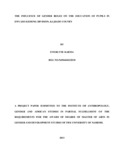| dc.contributor.author | Karisa, Everlyne | |
| dc.date.accessioned | 2013-11-25T13:40:02Z | |
| dc.date.available | 2013-11-25T13:40:02Z | |
| dc.date.issued | 2013 | |
| dc.identifier.citation | A Project Paper Submitted To The Institute Of Anthropology, Gender And African Studies In Partial Fulfillment Of The Requirements For The Award Of Degree Of Master Of Arts In Gender And Development Studies Of The University Of Nairobi | en |
| dc.identifier.uri | http://erepository.uonbi.ac.ke:8080/xmlui/handle/123456789/60105 | |
| dc.description.abstract | This was a cross-sectional study on the influence of gender roles on the education of pupils in
Ewuaso kedong division, Kajiado County. Specifically, the study sought to find out the effects of
gender roles on the education of pupils and to identify strategies put in place to counter the
effects of gender roles on the education of pupils. This study was guided by the Gender Relations
Theory by Ruth Pearson (1992) positing that society views all activities that are carried out to be
based on social roles and interactions of men and women.
Purposive sampling was used to select girls and boys for interviews as was for key informants
and focus group discussions. Data was collected through in-depth interviews, focus group
discussions and key informants interviews. Qualitative data collected was analysed thematically
guided by the study objectives. Verbatim amplifying the voices of the informants has been used
alongside main arguments in the discussion of the findings.
The findings indicate that both boys and girls are involved in different activities within the home
implying that the children are not only aware of their different home duties but are also
conscious of what the parents expects from them before they go to school and when they return
home. In addition, the pupils confirmed that, they are unable to do assignments given in school
due to the workload at home. They are obliged to work after school with no ample studying time
due to overwhelming domestic chores.
The study concludes that the gender roles have negative consequences due to the fact that gender
division of labour has lead to one gender being over burdened with work than the other. This has
contributed to lateness and absenteeism particularly with girls as compared to boys. It has
created a situation of one sex feeling superior to the other as a result of the honor, respect and
preferences that is given to male children, whereas girls are left feeling inferior and inadequate.
The study recommends increased community awareness creation and advocacy against high
burden labour to school children which impact negatively on their education achievements and
performance. More so, PTA meetings be used to strengthen the teacher-family relationships by
outlining the expectations of each stakeholder and their roles in addressing the gender role
burden on children with an aim of improving pupils’ overall performance. Furthermore, there is
need for a study on school-based approaches to dealing with effects of gender roles in education
of pupils to discern concrete issues around curriculum, mode of instruction and the teacherfamily
axis in helping pupils’ performance at school. | en |
| dc.language.iso | en | en |
| dc.publisher | University of Nairobi | en |
| dc.title | The influence of gender roles on the education of pupils in Ewuaso Kedong Division, Kajiado County | en |
| dc.type | Thesis | en |
| local.publisher | Institute of Anthropology, Gender & African Studies | en |

